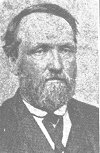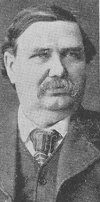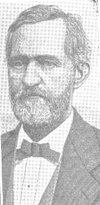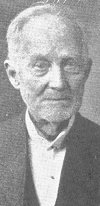|
FOR
five years after the organization of Macon
county and the platting of Decatur, the county
had no lawyer it could call its own. The
village probably had little appeal to a hustling
young attorney. Yet, in a new county, with
new problems arising, with the population
increasing, disputes to be settled, and not to
be forgotten - a brand new court house in which
to practice - Decatur had need for a
representative of the legal profession.
Finally one came. He not only had the
distinction of being the county's first resident
lawyer, but he proved to be the right sort for
the beginning of the history of the bar in Macon
county. That first lawyer was Charles
Emerson, native of New Hampshire.
Charles Emerson came to Illinois in
1833, attended Illinois college at Jacksonville
one term, studied law in Springfield, then chose
Decatur for a location to practice his
profession. He settled here in 1834, and
that was the beginning of a long and honorable
career. He lived in Decatur and Long Creek
township the rest of his life, except three
years from 1847 to 1850, when he resided in
Paris.

CHARLES EMERSON
Mr. Emerson was elected to the
legislature twice, served as circuit judge from
1853 to 1867, and in 1869 was elected to the
constitutional convention. He attended
part of the convention, but illness prevented
his remaining until the end. He passed
away in April, 1870. Mr. Emerson
had many admirable qualities which brought him
the respect and love of every one who knew him.
He was a man of modest disposition, charitable,
unaffected, broad-minded and impartial.
Macon county's second resident attorney, who
settled in Decatur in 1836 was Kirby Benedict,
who afterwards became associate justice of the
territory of New Mexico, an appointment he
received from President Franklin Pierce
in 1853. He served three years in that
office, and then was appointed chief justice of
the same territory.
Mr. Benedict was probate judge in
Macon county from 1838 to 1843. He
continued law practice here until 1849, when he
moved to Paris. His death occurred Feb.
28, 1874.
Joel S. Post was the first attorney
admitted to the practice of law from this
county. He came to Decatur in 1839 and
studied law with Charles Emerson.
He was admitted to the bar in 1841. Mr.
Post served in the War with Mexico, attaining
the rank of captain. In 1845 he was
elected to the state senate and served two
terms. During his service in the senate he
was instrumental in securing the passage of the
law establishing the state normal school at
Normal, Ill.
Macon county's first state's attorney was
Jonathan H. Pugh, a Springfield lawyer,
who came here for the first term of circuit
court. He was a brilliant lawyer, and was
one of the first in the state to advocate the
building of railroads. He served in the
state senate, and in 1834 was in the race for
governor of the state, but was defeated by
Joseph Duncan.
Samuel Drake Lockwood, who presided
over the first term of circuit court in Macon
county, was elected associate justice of the
Illinois supreme court in 1825 and held
that office until 1848. In 1825 Judge
Lockwood revised the Illinois criminal
code, and it remains largely the law today.
Judge Lockwood represented Morgan county in the
constitutional convention of 1847.
Decatur court rooms have seen a brilliant
array of lawyers in the hundred years of the
county's history.1
Some were men who reached high places in the
nation. The early custom of lawyers to
"ride the circuit" was responsible for bringing
many of them to Decatur. Yet Decatur can
be justly proud also of its long line of
resident lawyers, the men who established
practice here and who built up reputations at
home.
Stories have often been told of the days when
Decatur was in the eighth judicial circuit and
such men as Abraham
Lincoln, Stephen A. Douglas,
Leonard Swett, David Davis, John T.
Stuart, E. D. Baker
and other notable figures came here when court
was in session.
It was customary then for the lawyers to
travel from one county seat to another with the
court. The county seats thus had the
privilege of entertaining some of the most able
men of the profession.
CIRCUIT COURT JUDGES
During the first few years of Macon county's
existence, it was teh requirement that judges of
the supreme court do circuit court duty.
That is how it happened that Judge Samuel D.
Lockwood presided over circuit court in
Macon county from 1830 to 1835. When a law
was passed in 1835, which brought about the
separation of these two offices, Stephen T.
Logan was elected to the office of judge of
this circuit. Macon county was then a part
of the first judicial circuit.
As Illinois became more thickly settled and
the population increased, changed were made from
time to time in the division of the state into
judicial circuits. During these changes
Macon county was a part of several different
circuits. Under the apportionment of 1897,
when the number of circuits, outside of Cook
county, was increased to seventeen, Macon county
became a part of the circuit it is in today, the
Sixth. Other counties in the Sixth circuit
are Dewitt, Douglas, Moultrie, Piatt, and
Champaign.
PRESIDED IN DECATUR
Judges who have held court in Decatur since 1830
have been:
| S. D.
Lockwood,
1830-1835 |
|
Ferdinand
Bookwalter,
1888-1897 |
|
Stephen T.
Logan,
1835-1837 (resigned) |
|
Edward P.
Vail,
1888-1903 |
| Jesse
B. Thomas,
Jr., 1837-1839 |
|
Francis P.
Wright,
1891-1897 (resigned) |
|
Samuel H.
Treat,
1839-1849 |
|
William G.
Cochran,
1897-1910 |
| David
Davis,
1849-1853 |
|
Solon
Philbrick,
1903-1910 |
|
Charles
Emerson,
1853-1867 |
|
Franklyn H.
Boggs,
1914 to date |
|
Arthur J.
Gallagher,
1867-1872 |
|
William C.
Johns,
1903-1914 (died) |
| C. B.
Smith,
1872-1885 |
|
George A.
Sentel,
1915 to 1927 |
| W. E.
Nelson,
1877-1879 |
|
W. K.
Whitfield,
1914-1921 |
| Jacob
W. Wilkin,
1879-1888 (resigned) |
|
James
S. Baldwin,
1921 to date |
| James
F. Hughes,
1885-1891 |
|
|
RESIDENT LAWYERS
A. Brower Bunn, native of Ohio, who
came to Decatur in 1850, and who was considered
one of the city's best lawyers, was a man of the
dramatic effects, swaying the emotions of his
listeners with marked success. Mr. Bunn
held at different times the offices of city
clerk, city attorney, member of the legislature,
and assessor of internal revenue.
John W. Smith, native of Macon county,
was not only an able lawyer, but a writer of
considerable ability, and it was he who gave us
the first history of Macon county. He also
wrote a number of law texts. Mr.
Smith, a graduate of the Albany law
school in New York, began practice here as the
junior member of the firm of Emerson Clokey
and Brice I. Sterrett. After he
left Decatur he practiced law in Chicago.
Mr. Smith was deeply interested in books and
collected for his library many rare volumes.

JOHN W. SMITH
Sheridan Wait became a
resident of Decatur in 1852 and was a partner
first of Charles
Emerson and later of R. J. Oglesby.
During the war he was an adjutant-general, and
he also held the office of canal commissioner.
Colonel Nathan Tupper and
Lieutenant-Colonel Ansel Tupper,
brothers, came in 1854. They are mentioned
elsewhere, as is Richard J. Oglesby.
D. L. Bunn, who became a citizen of
Macon county in 1855, read law in the office of
Captain J. S. Post, and in 1862 was granted
license to practice law. From 1862 to 1868
he was state's attorney.

A. J. GALLAGHER
Judge Arthur J. Gallagher reached the
highest rank at the bar. He was a man of
great intellect and was known for his fairness.
He succeeded Charles Emerson as circuit
judge, and he was well fitted for that office.
He was elected to the bench in 1867 and served
until 1873. He was a member of the law
firm of Gallagher, Wait and
Oglesby. Also, at another time he was
in partnership with Jerome R. Gorin.
Judge Gallagher came to Decatur in
1856 from Vandalia, where he had been practicing
law. He studied law with Lyman Trumbull,
at Belleville. In 1852 he was elected to
the legislature, and he also served as register
of the U. S. land office in Vandalia.
Judge Gallagher married Rachel
Smith, the daughter of E. O. Smith,
in 1865.
Coming in 1857, William E. Nelson all
his life was a leading lawyer and civic worker.
He was on a state commission in 1869, a member
of the legislature in 1871, circuit judge in
1877, county judge from 1886 to 1894.
Judge Anthony Thornton was one of the
most able lawyers that ever practiced in Macon
county. He came here from Shelbyville, and
after a few years residence in Decatur returned
to Shelbyville.
Among other distinguished lawyers who
practiced in Decatur were C. C. McComas,
state's attorney; Hugh
Crea, known particularly for his
attention to railroad law; K. H. Roby,
partner of William E. Nelson; S. F.
Greer, county judge, member of board of
education and member of city council; John R.
Eden, member of congress; Isaac A.
Buckingham, city attorney, state's attorney,
and in general practice for many years; C. A.
Ewing of the firm of Crea and
Ewing; Isaac R. Mills, city attorney,
state's attorney, and district revenue
collector, who was killed in a railroad wreck at
Litchfield in 1904; E. P. Vail
and W. C. Johns, both of whom

WM. E. NELSON
served as circuit judge. Mr. Vail,
who was on the bench form 1888 to 1903, left
Decatur for Chicago where he established a law
practice. W. C. Johns was judge
from 1903 until his death in 1914.
BAR ASSOCIATION
In the year 1902 the members of the Decatur
Bar organized the Macon County Bar association,
its object being to maintain a law library and
to promote fraternal spirit among the members.
Judge W. C. Johns was the first president
and James S. Baldwin its secretary.
The library established has been added to from
time to time and is now an extremely valuable
collection of books valued at about $20,000.
In 1923 the association presented the library to
Macon county, upon condition that the county
assume care and control of it and keep up the
continuations. The library is now housed
in the court house and is open to the public.
The Macon County Bar association was dissolved
and the Decatur Bar association was then
organized and is still functioning.
------------------
1
In early days the court had an important officer
that is not known in present day life. He
was the court crier. It was his business
to call the witnesses and litigants into court
when their cases were called. John
Moreland, court crier
for years, had a voice well adapted for the
part. It was like a trumpet and could be
heard for blocks away. When some one was
wanted, Moreland
went to the second story of the court house,
leaned out of a window, and in stentorian voice
called out the name of the person wanted.
This was his method: "W--J--Con-dell, W. J.
Condell, W. J. CONDELL, COME TO COURT."
The custom of court crier was discontinued after
Arthur J. Gallagher
became judge. He ruled that it was the
business of litigants and witnesses to be at the
court house when their cases were called.
Moreland ran a bus
between the
Cloudas
house and the depot. As an announcer of
schedules he could have given pointers on
clearness to present day radio announcers.
<PREVIOUS> <NEXT>
<CLICK HERE TO RETURN TO TABLE OF CONTENTS>
|